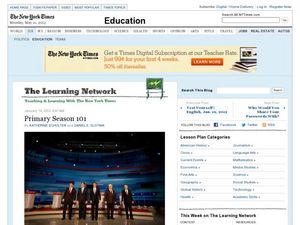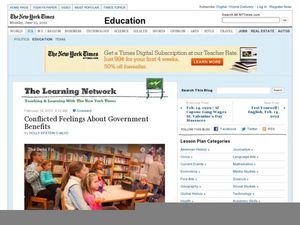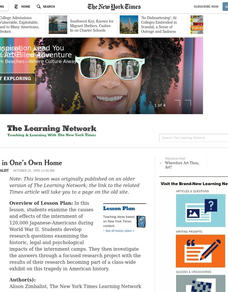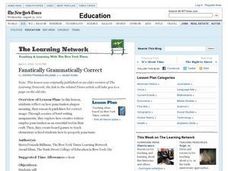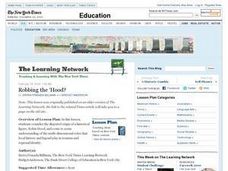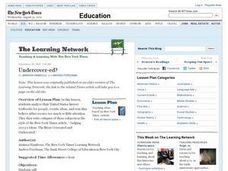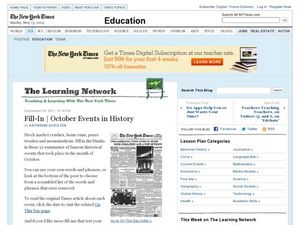Curated OER
The Euro in Crisis
The November 14, 2011 edition of the New York Times included an article about debt and the European economy. Critical readers use the article to answer 13 who, what, when, where, and why questions.
Curated OER
Primary Season 101
While this New York Times resource posted several months ago it could still be a useful learning experience. Learners practice using the Times's Campaign 2012 Politics section to help them answer 16 questions about the Republican...
Curated OER
The New YouTube
Can you guess how many hits YouTube gets in one day? If you said two billion, you're wrong. If you said three billion, you're getting closer, but you're still over a billion hits away! Use this article to bring current events into the...
Curated OER
Conflicted Feelings About Government Benefits
Government spending on social programs in the US is a big topic. It is also the current event kids will read about as they delve into this issue of the New York Times. They'll read the article, then answer seven comprehension questions....
Core Task Project
Whatif by Shel Silverstein
What a skillful way to incorporate Shel Silverstein, a wonderful author, into the classroom. Composed of three tasks, children are led through a series of text-dependent questions that force them to unveil the meaning of Silverstein's...
Curated OER
Prisoner in One's Own Home
Examine the internment of Japanese-Americans during World War II. After reading an article from the New York Times and exploring the author's word choice, young readers find the central idea in the text and work on researching additional...
Curated OER
Steer Clear of Trouble
Inform teenagers about safe driving techniques. Young journalists use the Internet to investigate safe driving practices and technologies then publish a manual for the teen drivers in their life.
Curated OER
Fanatically Grammatically Correct
Research guidelines for correct usage, then explore how creative writers employ punctuation as an essential tool in their craft. Secondary classes create board games to teach elementary school students how to properly punctuate. From the...
Curated OER
Not Just the Facts
Encourage your learners to explore the differences between hard news and news analysis. They outline a complex news analysis about the upcoming presidential election, then endeavor to write an analysis of the same topic, using local...
Curated OER
Of Human Bondage
How does the particular point of view in a situation affect the way it is presented? Focusing on perspectives on slavery during the Civil War, middle schoolers use research to write narratives from the points of view of their historical...
Curated OER
Stop the Fighting and Start Uniting
Research current and proposed peace talks around the world with this New York Times lesson, Using the Darfur peace talks in Abuja, Nigeria as a starting point, middle schoolers create a news program on the subject. They propose a future...
Curated OER
Robbing the 'Hood?
Students investigate historical figures and how they play a role in tourism by reading and discussing the article "When Robin Hood Supped, Was it Yorkshire Pudding?" In groups, students investigate issues related in the article in...
Curated OER
Undercover-ed
Have your class engage in critical-thinking activities using this resource. Learners discuss a variety of topics they think get too much, or too little, attention from the press. They analyze why these topics are over or underrated....
Curated OER
The Play's the Thing
Students describe to a partner theater experiences they have had in their lives that were memorable, and analyze why. They study about one director's original artistic choices for staging Shakespeare by reading and discussing "Nature's a...
Curated OER
Winning "The Voice": Cloze Exercise
This New York Times Learning Network exercise provides a cloze exercise along with a word bank that readers can use to complete the passage about the television show, "The Voice" and Jermaine Paul, a recent winner. Another option is to...
Curated OER
What Science Suggests About 'Weather Weirding'
Here is an activity that you can use to help upper elementary or middle schoolers to meet Common Core literacy standards for science and technology. Youngsters read the article on extreme weather patterns, "Weather Runs Hot and Cold, So...
Curated OER
Fill-In - October Event in History
A lot has happened in the month of October in the past 100 years or so. Kids fill in the blank for 31 events, each of which occurred on a day in October. Each event can be found in a New York Times article from the past 100+ years....
Curated OER
In Legal Limbo
Newspapers are great learning tools. They act as a conduit for current events, reading comprehension, and critical thinking. Here, pupils read a New York Times article regarding US immigration law under the Obama administration and...
Curated OER
Where the Books Are
The news is full of interesting stories and ideas shared in an informational style. Readers use the provided who, what, when, where, and why questions as they explore an article about a man who is passionate about archiving physical...
Curated OER
The 'Question of Palestine'
New York Times covers hot topics and current events, now you may use those articles to help young people become more aware. Kids read an article regarding the Israeli-Palestinian agreement and the prospect of Palestine joining the UN....
Curated OER
Fill-In : Corn Mazes
Can you actually get lost in a corn maze? Kids read how one family was so lost that they called 911 for help. An interesting piece of informational text put out by the New York Times is here to entertain and educate. As they read the...
Curated OER
Student Opinion: When Did You Have a Great Conversation?
Conduct a classroom conversation about communication using this resource as a jumping-off point. For this The Learning Network activity, learners read an excerpt from The New York Times opinion piece, "The Flight From Conversation," and...
Curated OER
The Start of a New Era for Roman Catholics
Read all about it! Check out this article from the New York Times. Kids read about changes made to the wording used in Catholic Mass. They consider these changes by responding to each of the 10 related questions that ask, who, what,...
WK Kellogg Biological Station
Sounds of Selection
Do you want a creative and fun way to teach about natural selection? Hop to it by turning your middle school princes and princesses into frogs trying to catch as many bugs as possible in a Hungry Hungry Hippos style game. For high...



